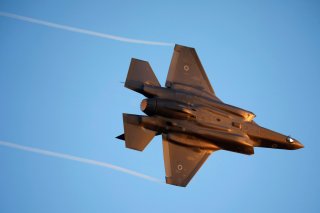Why Israel's F-35 Stealth Fighter Variant Is Truly Special
Israel needed a unique F-35 to address the unique threats it faces.
While the Israeli Defense Forces certainly have the firepower necessary to project power throughout the world, it makes sense that the country primarily focuses on the regional threats posed by Iran, Hamas, Hezbollah, and other terrorist actors. This is exactly why Israel has developed the connectivity needed to address asymmetrical threats by modifying its F-35 variant to accommodate regional command and control networks and high-tech datalinks.
Israel requires a strong military force capable of deterring its hostile neighbors. However, due to the asymmetrical threats Israel faces, it must deter more than just ground attacks. Terrorist groups and Iranian-backed militias pose unique threats that are much different than those posed by conventional forces. This environment includes the risk of being targeted by mobile ballistic missile launchers from Iran or shorter-range rockets from Lebanon and Gaza. Fortunately, the offensive strike capabilities provided by the F-35 allow Israel to destroy these asymmetrical threats without having to rely solely on a defensive posture.
This challenging environment is likely why Israel modified its Joint Strike Fighters into its own F-35I Adir fighter variant. Israel had its specific needs and regional threats in mind when developing its tailored F-35 variant.
The fighter’s intelligence, surveillance, and reconnaissance capabilities allow pilots to identify and target the mobile rocket launchers that are often used to attack Israel.
While Israel’s Adir employs the advanced technology that all F-35s have, it also incorporates Israeli computing, surveillance, command and control, and datalink systems that were designed to counter regional threats. Notably, the Israeli variant is engineered to address asymmetrical threats like mobile rocket launchers and other weapons used by terrorists and militant groups. Datalinks allow Israeli pilots to communicate with friendly ground forces and locate the positions of surface-to-surface rocket and missile launchers.
Israel needed a fighter capable of countering the unique challenges it faces in the Middle East. The Adir F-35 variant does just that.
Kris Osborn is the Defense Editor for the National Interest. Osborn previously served at the Pentagon as a Highly Qualified Expert with the Office of the Assistant Secretary of the Army—Acquisition, Logistics & Technology. Osborn has also worked as an anchor and on-air military specialist at national TV networks. He has appeared as a guest military expert on Fox News, MSNBC, The Military Channel, and The History Channel. He also has a Master's Degree in Comparative Literature from Columbia University.
Image: Reuters.

